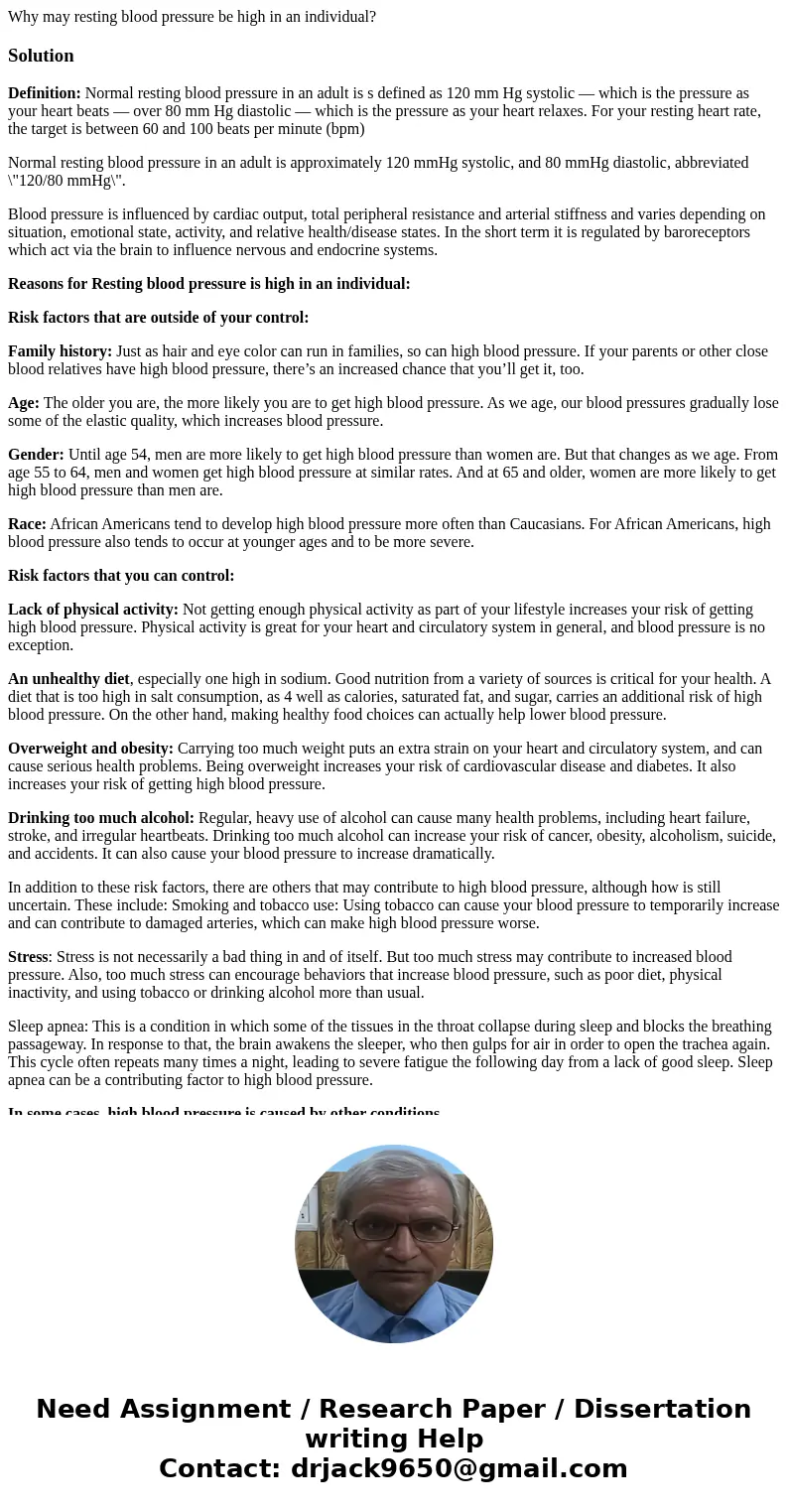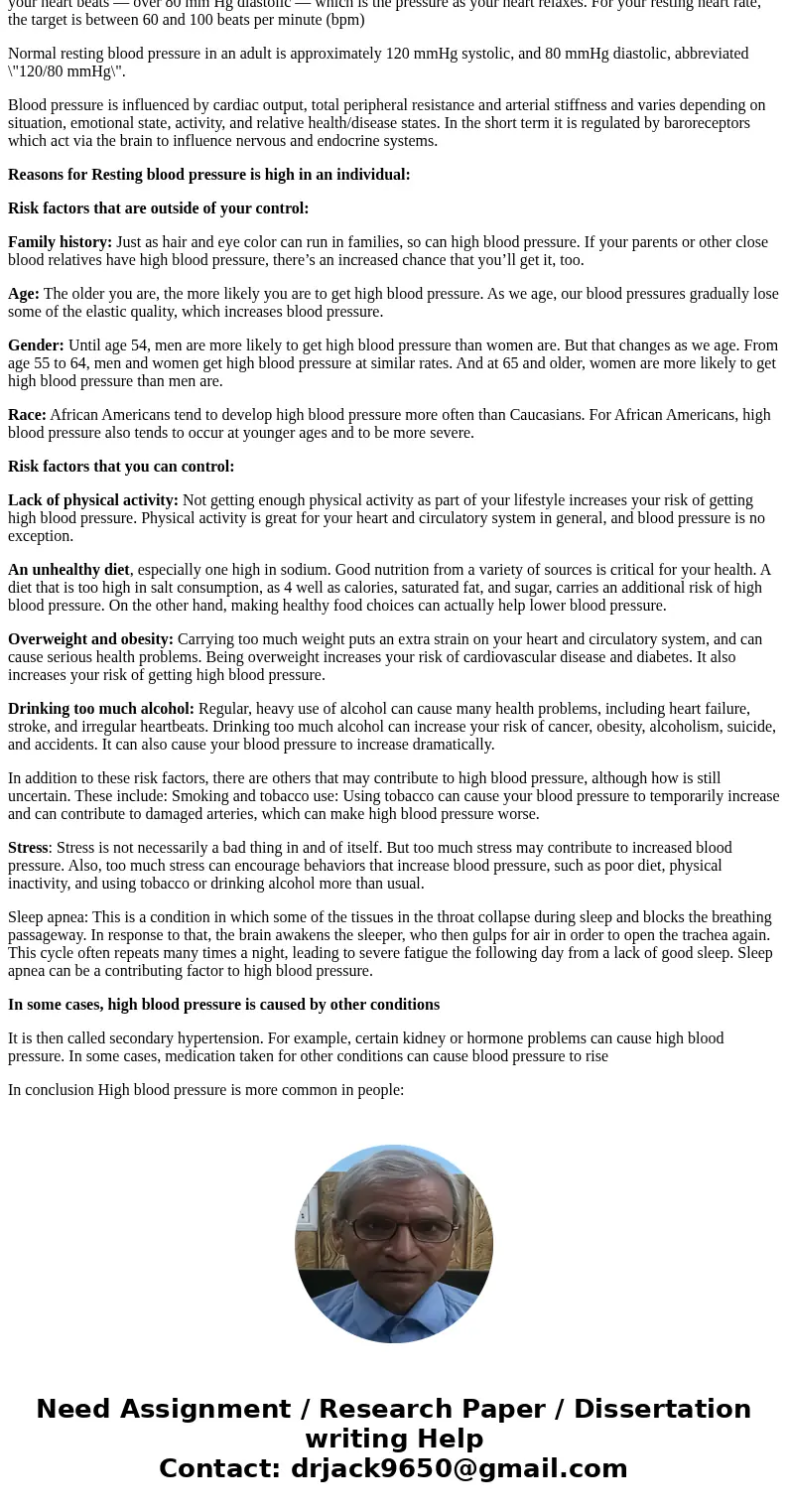Why may resting blood pressure be high in an individualSolut
Why may resting blood pressure be high in an individual?
Solution
Definition: Normal resting blood pressure in an adult is s defined as 120 mm Hg systolic — which is the pressure as your heart beats — over 80 mm Hg diastolic — which is the pressure as your heart relaxes. For your resting heart rate, the target is between 60 and 100 beats per minute (bpm)
Normal resting blood pressure in an adult is approximately 120 mmHg systolic, and 80 mmHg diastolic, abbreviated \"120/80 mmHg\".
Blood pressure is influenced by cardiac output, total peripheral resistance and arterial stiffness and varies depending on situation, emotional state, activity, and relative health/disease states. In the short term it is regulated by baroreceptors which act via the brain to influence nervous and endocrine systems.
Reasons for Resting blood pressure is high in an individual:
Risk factors that are outside of your control:
Family history: Just as hair and eye color can run in families, so can high blood pressure. If your parents or other close blood relatives have high blood pressure, there’s an increased chance that you’ll get it, too.
Age: The older you are, the more likely you are to get high blood pressure. As we age, our blood pressures gradually lose some of the elastic quality, which increases blood pressure.
Gender: Until age 54, men are more likely to get high blood pressure than women are. But that changes as we age. From age 55 to 64, men and women get high blood pressure at similar rates. And at 65 and older, women are more likely to get high blood pressure than men are.
Race: African Americans tend to develop high blood pressure more often than Caucasians. For African Americans, high blood pressure also tends to occur at younger ages and to be more severe.
Risk factors that you can control:
Lack of physical activity: Not getting enough physical activity as part of your lifestyle increases your risk of getting high blood pressure. Physical activity is great for your heart and circulatory system in general, and blood pressure is no exception.
An unhealthy diet, especially one high in sodium. Good nutrition from a variety of sources is critical for your health. A diet that is too high in salt consumption, as 4 well as calories, saturated fat, and sugar, carries an additional risk of high blood pressure. On the other hand, making healthy food choices can actually help lower blood pressure.
Overweight and obesity: Carrying too much weight puts an extra strain on your heart and circulatory system, and can cause serious health problems. Being overweight increases your risk of cardiovascular disease and diabetes. It also increases your risk of getting high blood pressure.
Drinking too much alcohol: Regular, heavy use of alcohol can cause many health problems, including heart failure, stroke, and irregular heartbeats. Drinking too much alcohol can increase your risk of cancer, obesity, alcoholism, suicide, and accidents. It can also cause your blood pressure to increase dramatically.
In addition to these risk factors, there are others that may contribute to high blood pressure, although how is still uncertain. These include: Smoking and tobacco use: Using tobacco can cause your blood pressure to temporarily increase and can contribute to damaged arteries, which can make high blood pressure worse.
Stress: Stress is not necessarily a bad thing in and of itself. But too much stress may contribute to increased blood pressure. Also, too much stress can encourage behaviors that increase blood pressure, such as poor diet, physical inactivity, and using tobacco or drinking alcohol more than usual.
Sleep apnea: This is a condition in which some of the tissues in the throat collapse during sleep and blocks the breathing passageway. In response to that, the brain awakens the sleeper, who then gulps for air in order to open the trachea again. This cycle often repeats many times a night, leading to severe fatigue the following day from a lack of good sleep. Sleep apnea can be a contributing factor to high blood pressure.
In some cases, high blood pressure is caused by other conditions
It is then called secondary hypertension. For example, certain kidney or hormone problems can cause high blood pressure. In some cases, medication taken for other conditions can cause blood pressure to rise
In conclusion High blood pressure is more common in people:


 Homework Sourse
Homework Sourse